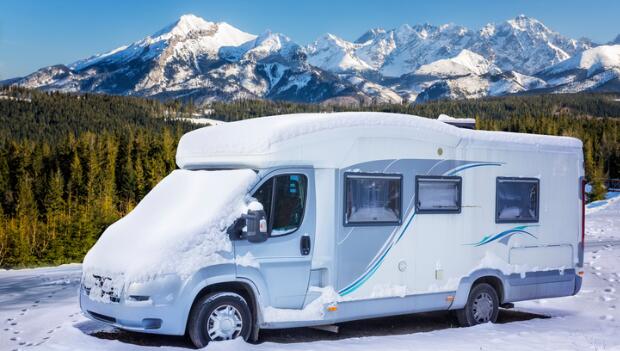
The temperatures are low and the days are short but that doesn't mean you can't enjoy RV camping in the wintertime. Campgrounds that are open are generally empty, the crisp air is quiet and the landscape is peaceful. Still, the best part: no bugs.
Have a safe and relaxing winter trip with these tips to help you prepare your RV and enjoy an offseason adventure.
Prep Your RV for Winter
Before heading out, the most important thing to do is make sure your rig will be up to the rigors of winter camping. Most current RVs are designed, built and insulated to take cold weather in stride. Even if you don't have the latest in RV technology you can still make your trailer or motorhome cozy.
Exterior
Check window seals and re-caulk where needed. Examine the weather stripping on all exterior doors--especially the entry--basement areas and access panels and replace if necessary to keep cold drafts out.
You can also cut insulating foam boards, available at home improvement centers, to fit snugly between the RV frame and the ground all the way around the base of your rig. This barrier will help insulate tanks, water lines and the floor by blocking out cold air. RV skirts can help, though they don't provide as much insulation.
Holding Tanks
Empty your black and gray water tanks before your trip. Add about a quart of special pink RV antifreeze (not the green kind used in cars) to each. This will protect the dump valves from freezing. Insulate the pipes draining into the tanks with foam pipe insulation, and consider adding electric pipe heaters if you'll be camping in below freezing temperatures for an extended time. Note: you'll need an electric hook-up or generator for this.
You can also add holding tank heaters, which are available in 12V DC and 120V AC models.
Special tip: Wrap your sewer hose in insulation or heat tape. This will help prevent ice dams from forming inside. Some veteran snow campers use their sewer hose only to dump their tanks; then they clean the hose and store it in a heated compartment immediately. A frozen hose is likely to split when you disconnect it.
Don't empty your tanks until you're ready to leave. This will help prevent ice from forming.
Fresh Water Hose
If you have a fresh water hook-up, consider buying a heated water hose to prevent freeze-ups or bursting. These are controlled with a thermostat and AC power is required to operate. Keep all hoses and cables off the ground or out of the snow.
Better still: fill your fresh water tank, and then disconnect your hose from the campground faucet and let the water drain out.
Water Pump
If your water pump is located in an insulated exterior storage area, a small space heater can help keep it from freezing.


